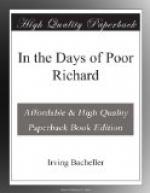Next evening came the good Doctor Barclay, a friend of Franklin, and a noted philanthropist. They played chess together, and after the game, while they were draining glasses of Madeira, the philanthropist said:
“Here’s to peace and good will between England and her colonies. The prosperity of both depends upon it.”
They drank the toast and then Barclay proposed:
“Let us use our efforts to that end. Power is a great thing to have and the noblest gift a government can bestow is within your reach.”
“Barclay, this is what I would call spitting in the soup,” said Franklin. “It’s excellent soup, too. I am sure the ministry would rather give me a seat in a cart to Tyburn than any other place whatever. I would despise myself if I needed an inducement to serve a great cause.”
The philanthropist entered upon a wearisome argument, which lasted for nearly an hour.
“Barclay, your opinions on this problem remind me of the iron money of Lycurgus,” observed Franklin.
The philanthropist desired to know why.
“Because of their bulk. A cart load of them is not worth a shilling.”
In all parts of Britain those days one heard much ridicule of the New England home and conscience. Now the ministry and its friends had begun to butt their heads against the immovable wall of character which had grown out of them and of which Lord Chatham had said:
“It has made certain of our able men look like school boys.”
2
There was at that time a man of great power whose voice spoke for the soul of England. He had studied the spirit of the New World and probed to its foundations. He will help us to understand the new diplomacy which had filled the ministers with astonishment.
The same week Jack was invited to breakfast with Mr. Edmund Burke and Doctor Franklin. He was awed by the brilliancy of the massive, trumpet-tongued orator and statesman.
He writes: “Burke has a most ungainly figure. His gait is awkward, his gestures clumsy, his eyes are covered with large spectacles. He is careless of his dress. His pockets bulged with papers. He spoke rapidly and with a strong Irish brogue. Power is the thing his face and form express. His knowledge is astounding. It is easy to talk with Franklin, but I could not talk with him. He humbled and embarrassed me. His words shone as they fell from his lips. I can give you but a feeble notion of them. This was his idea, but I remember only a few of his glowing words:
“’I fancy that man, like most other inventions, was, at first, a disappointment. There seems to have been some doubt, for a time, as to whether the contrivance could be made to work. In fact, there is good ground for believing that it wouldn’t work.
“’It was a failure. The tendency to indolence and folly had to be overcome. Sundry improvements were necessary. An imagination and the love of adventure were added to the great machine. They were the things needed. Not all the friction of hardship and peril could stop it then. From that time, as they say in business, man was a paying institution.




